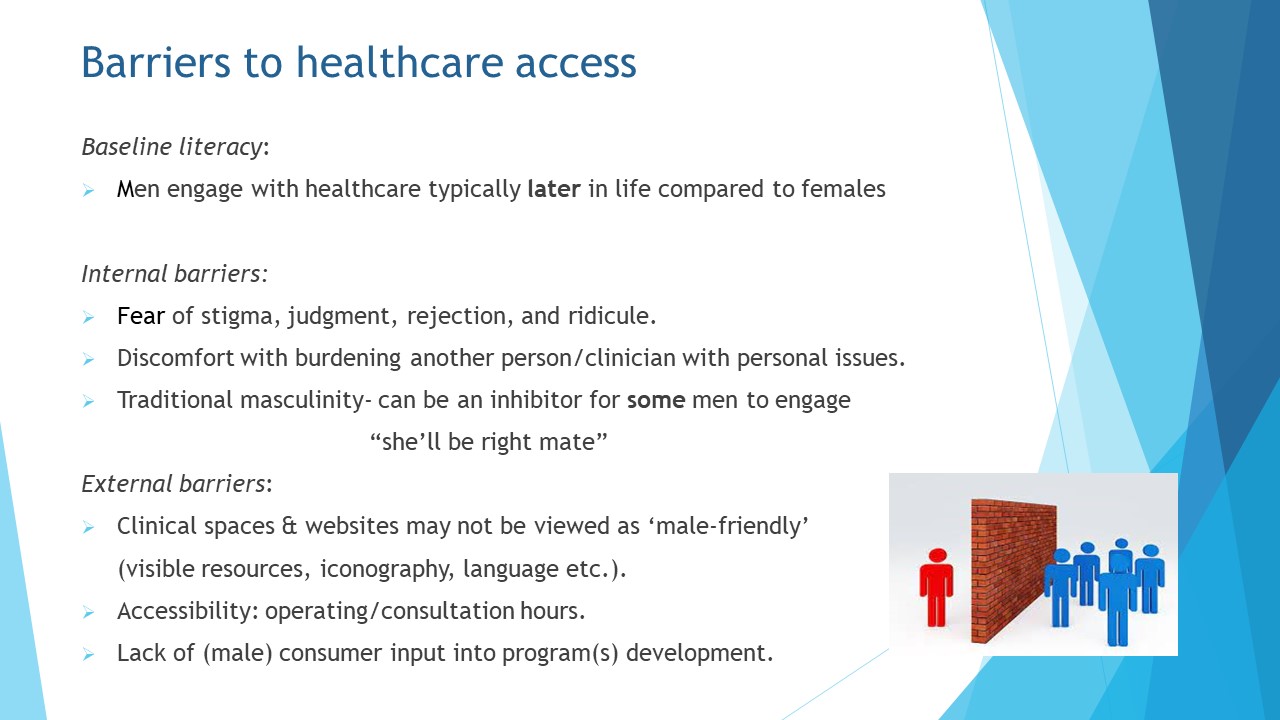Engaging males in healthcare by Michael Whitehead, Men’s Health Clinical Nurse Consultant
 Anthea Talliopoulos, APD
Anthea Talliopoulos, APD
Engaging males in healthcare: Men’s Health Week 2023 by Michael Whitehead, Men’s Health Clinical Nurse Consultant
Despite making up 49% of the population in Australia, men have a low participation in primary healthcare services, both from an employment perspective amongst dietitians (where 7% of Australian dietitians identify as male), as well as engaging in preventative healthcare services as clients. It is crucial that men’s health is advocated for, especially given that 75% of suicides are male, 1 in 6 men will be diagnosed with prostate cancer, and that 20% more males are overweight/obese when compared to females. Men are also less likely to engage in routine healthcare screening, placing them at elevated risk of late diagnosis for chronic diseases and cancer.
Further to this, internal barriers, especially psychological barriers such as a fear of stigma, judgement, rejection, and ridicule reduce the likelihood of men engaging in healthcare. External barriers such as difficulty accessing healthcare (including outside of the working day), having clinical spaces and resources which are not ‘male-friendly’, and a lack of male input into program development can limit male healthcare engagment.
In navigating the best ways to engage males in healthcare services, Men’s Health Clinical Nurse Consultant Michael Whitehead discusses the importance of reflective practice in developing a male-friendly service and considering what makes a ‘male-friendly’ space. Rapport building and effective communication frameworks to encourage discussion, and advocacy for men’s health through promotions such as Movember and Men’s Health week can further increase male engagement in dietetic healthcare services.
Summary:
- Men are less likely to engage in healthcare services, being especially problematic given current statistics such as 75% of suicides are male, 1 in 6 will be diagnosed with prostate cancer, and that 20% more males are overweight/obese
- Internal barriers (such as psychological barriers), and external barriers (such as less ‘male-friendly’ clinical spaces and resources) can further reduce male engagement in healthcare services.
- Ensuring that effective strategies are in place to overcome these barriers such as engaging in a reflective practice, ensuring that the clinical space and any digital platforms are ‘male-friendly’, and focusing on rapport building (such as in discussing occupation or what is important to them), can help to increase male engagement in nutrition and dietetic healthcare services.
Michael Whitehead is the Men’s Health Clinical Nurse Consultant at St Vincent’s Hospital in Sydney, Australia, and the clinical lead for the St Vincent’s NELUNE Men’s Health Centre. Michael is a published author, researcher, presenter and men’s health advisor, who has presented at numerous men’s health forums, webinars and conferences locally and internationally. Recent collaborative work includes Family Planning NSW, Healthy Male and the Movember Foundation. Michael has a Masters in Clinical Nursing focusing on primary and preventative health and has recently completed studies in Clinical Redesign with the NSW Agency of Clinical Innovation (ACI). He has presented alongside the World Health Organisation and at the World Congress of Public Health.
To register for the presentation and associated documents including the assessment quiz click here
This presentation is useful for all dietitians seeking to ensure that the services they offer in their workplace are appropriate to men’s health needs.

